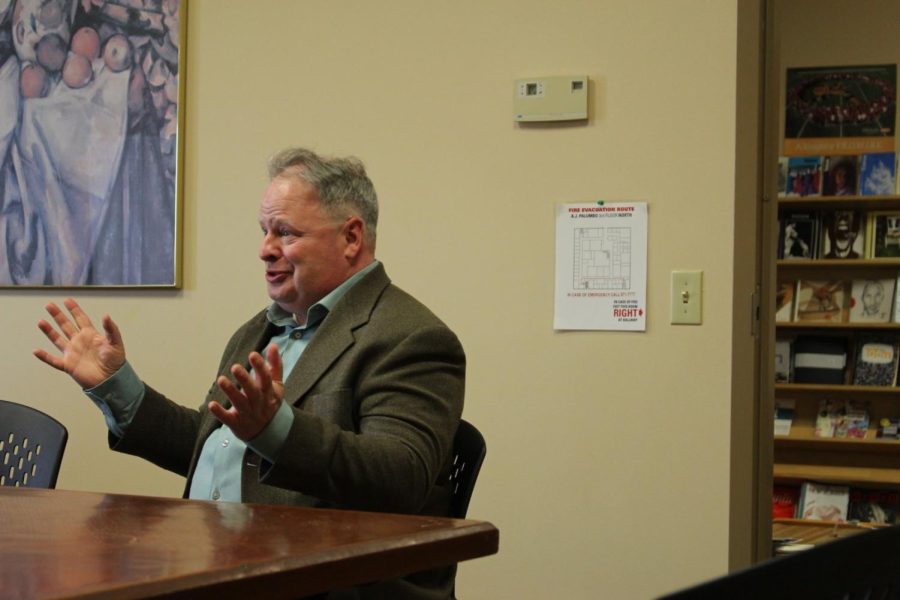Everett De Morier speaks at Gannon Tuesday
‘Thirty-three Cecils’ novelists led writing workshop in Palumbo
Everett De Morier speaks to small group of students at afternoon workshop.
March 16, 2022
Author Everett De Morier visited Gannon University’s campus Tuesday, joining English professor Douglas King’s Literature and Film class and leading a writing workshop, both in the Palumbo Academic Center.
De Morier’s 2015 novel “Thirty-three Cecils” is largely set in Erie and includes mentions of Gannon. During his time in the Flagship City, De Morier visited landmarks such as the Warner Theatre, Presque Isle, Hamot and various downtown locations.
While speaking in King’s class, De Morier admitted that even though he has 30 years of writing under his belt, writing the screenplay for the film adaptation for “Thirty-three Cecils” was the hardest thing he’s ever done. He spoke to how difficult it is to include all the aspects of a film a viewer sees on-screen and translating that on paper.
For this film adaptation, De Morier has been working closely with producer Brian Esquivel, known for “The Institute” and “Entourage.”
When being asked by a student about the accuracy of book-to-film adaptations, De Morier said, “it’s my book, it’s their movie.” He further elaborated on how certain elements are unique to the novel and do not fit in the film, and vice versa.
During his class visit, many students brought up a major question: why Erie?
To this, the Binghamton, N.Y. native explained how Erie is far enough away from his hometown to be different, yet close enough for connections between characters to be realistic. He also told King and his students two stories of an Erie native colleague that he kept special memory of.
To better understand Gannon’s home city, De Morier watched hundreds of YouTube videos of baseball games, church events and backyard cookouts —anything and everything that could help him better understand the primary setting of his story.
Another major topic of the morning was publishing. De Morier put strong emphasis on how rejection plays a big role in trying to have pieces published and how many writers hold back from facing publishers due to fear of rejection.
To this, he said that “you have to learn to love rejection.” De Morier followed this up with his own experience, and how each time the editor of “Thirty-three Cecils” reached out to him with critiques, he was excited for their input.
I asked De Morier to describe his novel in three words, to which he responded, “It got published!”
The author explained how this storyline is unique from what is typically picked up by major publishers like the Big Five, which includes companies Penguin Random House and Macmillan.
“Readers are hungry for something that is different but real,” De Morier said, and expressed how the success of “Thirty-three Cecil’s” comes from its uniqueness.
A small group of students joined De Morier for a writing workshop held in the English department’s conference room, where they were able to ask specific questions, share experiences and even some laughs with the author.
De Morier shared details of the publishing process for “Thirty-three Cecil’s,” his opinions on traditional versus self-publishing, the importance of showing rather than telling in writing and gave students advice in response to various questions. He emphasized the consideration of how important it is to write, but it is even more important to have something to say.
De Morier also explained how someone chasing money and fame can be successful, but true success is defined by the wanting to keep getting better, tying into his morning discussion about rejection.
The final question of the afternoon was: what advice would you give to young writers?
De Morier responded with two specific answers: to read — as the exposure to other writers’ styles can help you build your own — and to write badly.
He said that writing badly isn’t something to be ashamed or afraid of; spilling everything out that’s in your head onto a page is very beneficial. Details of those bad writings can serve important roles in another piece.
Tuesday evening, De Morier also led a reading of “Thirty-three Cecils” in Palumbo’s third floor atrium.
LIA EBERLEIN



















